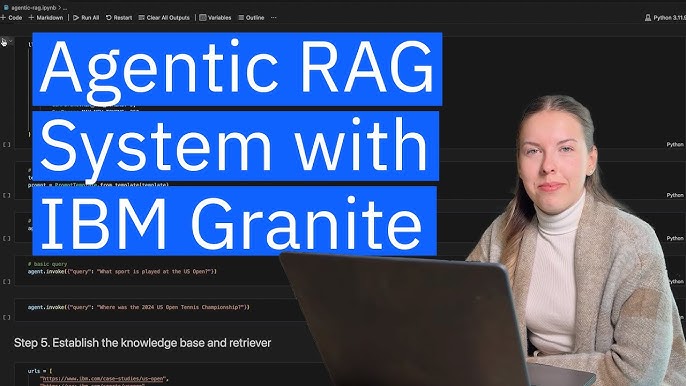IBM launches Granite 3.1: open LLMs with native retrieval

IBM has released Granite 3.1, a family of open large language models that natively integrate retrieval-augmented generation (RAG), targeting enterprise use cases that demand grounded, auditable answers.[1] The update adds built‑in connectors for vector databases and IBM’s watsonx Knowledge Catalog, allowing the models to cite sources and enforce data governance without custom orchestration code—an approach positioned to reduce hallucinations and speed production deployments.[1]
What’s new and why it matters
- Native RAG pipeline: Granite 3.1 exposes first‑class retrieval hooks that let teams plug in corporate knowledge bases and policy‑controlled catalogs directly, enabling answers with inline citations and access controls applied end‑to‑end.[1]
- Enterprise readiness: IBM emphasizes governance (catalog lineage, PII masking) and audit trails so regulated industries can track which documents influenced a model’s response—a gap in many general‑purpose LLM stacks.[1]
- Open weights and tooling: Models are released under open licenses via Hugging Face and watsonx, with example configs for popular vector stores, aiming to lower vendor lock‑in and simplify compliance reviews.[1]
Performance and size options
IBM says Granite 3.1 improves factual grounding and reduces unsupported claims versus prior Granite releases when used with retrieval, with latency competitive to similar 7B–20B open models in RAG settings.[1] While headline synthetic benchmarks aren’t the focus, IBM provides enterprise‑style evaluations (domain QA with citation accuracy) and reports higher citation validity and lower refusal rates on internal datasets compared to Granite 3.0.[1]
How it compares
- Built‑in governance: Unlike many RAG examples that glue a general LLM to a retriever with custom code, Granite 3.1 bakes policy and lineage into the retrieval path, which can simplify audits for sectors like finance and healthcare.[1]
- Open and interoperable: By publishing weights and connectors, IBM targets teams standardizing on open tooling while needing vendor‑supported compliance features.[1]
Early adoption and ecosystem
Granite 3.1 is available now in IBM watsonx and as downloadable weights, with reference integrations for vector databases, document loaders, and catalog governance rules.[1] IBM highlights pilots where customer service and risk teams deploy grounded assistants that must cite authoritative policies and contracts, reducing manual verification workload.[1]
What’s next
IBM plans expanded multimodal retrieval and richer citation objects (passage‑level offsets, confidence), plus tighter integration with data lineage systems so organizations can prove exactly which records shaped a response.[1] If widely adopted, native, governed RAG could become a default enterprise pattern—trading a bit of raw model flash for verifiable answers and smoother compliance sign‑off.
How Communities View IBM Granite 3.1
Discussion centers on whether native, governed RAG is a real differentiator for enterprises or just packaging around common open‑source stacks.
-
Governance-first pragmatists (~40%): Practitioners on r/MachineLearning and r/dataengineering argue that end‑to‑end lineage, PII masking, and source citations "out of the box" will cut months from regulated deployments. Posts emphasize fewer glue scripts and easier audits for banks/insurers.[1]
-
Open‑source integrators (~30%): Engineers on r/LocalLLaMA and r/devops contend that Haystack/LlamaIndex + open LLMs already deliver similar results, questioning whether Granite adds enough beyond better docs and support contracts. Some praise open weights and Hugging Face availability.[1]
-
Skeptical benchmarkers (~20%): X users like @ml_performance ask for apples‑to‑apples evaluations versus leading 7B–13B models in retrieval settings, noting the lack of public leaderboard wins. They want public datasets with citation‑validity metrics and latency profiles.[1]
-
IBM customers and SI partners (~10%): Consulting leaders and IBM ecosystem accounts on X highlight reduced hallucinations and faster go‑lives in pilots, citing improved citation accuracy and policy enforcement with watsonx catalogs.[1]
Overall sentiment: cautiously positive among enterprise teams that prioritize compliance and auditability, with open‑source communities reserving judgment pending public RAG benchmarks and broader third‑party evaluations.